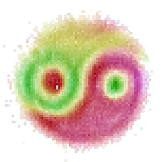



 NEXT
NEXT
 BACK
BACK
 Forum
Forum


Philosophical musings on Quanta & Qualia; Materialism & Spiritualism; Science & Religion; Pragmatism & Idealism, etc.




A philosophical worldview or belief system grounded on the 20th century discovery that Information, rather than Matter, is the fundamental substance of everything in the universe. It is intended to be the 21st century successor to the ancient worldviews of Materialism and Idealism. An Update from Bronze Age to Information Age. It's also a Theory – of – Everything that covers, not just matter & energy, but also Life & Mind & Love.
1. Cosmos :
The cosmos is an ancient Greek name for the universe. Using the word cosmos implies viewing the universe as a complex and orderly system or entity. Anaxagoras further introduced the concept of a Cosmic Mind (Nous) ordering all things.
https://en.wikipedia.org/wiki/Cosmos
2. Cartesian Theater :
a derisive term coined by philosopher and cognitive scientist Daniel Dennett to refer pointedly to a defining aspect of what he calls Cartesian materialism, which he considers to be the often unacknowledged remnants of Cartesian dualism in modern materialist theories of the mind. https://en.wikipedia.org/wiki/Cartesian_theater
Click here for popup image
3. Enformationism :
A philosophical worldview or belief system grounded on the 20th century discovery that Information, rather than Matter, is the fundamental substance of everything in the universe.
https://blog-
Post 131. August 28, 2023
Creative Mind and Cosmic Order
Physics and Metaphysics
The “Mind” referenced in Pinter’s book title is the collective intellect of homo sapiens, a species of rational animals whose sensory apparatus has been honed by eons of evolution to “see” not only what is right in front of them, but also what could be in another time & place. Yet, by inference from “Cosmos”¹ in the title, it could also be referring to a Universal mind-
The traditional opposing philosophical positions on the Mind vs Matter controversy are Idealism & Realism. But Pinter offers a sort of middle position that is similar in some ways to my own worldview of Enformationism³. His theory has a prominent role for Information, but places more emphasis on how the brain processes incoming bits of information into conceptual chunks that clump together as ideas with personal meaning. That composite way of knowing is called Holism⁴. But the author’s preferred term is Gestalt⁵, which emerged in 20th century Europe as a structural form of psychology. Without even thinking about it, the human brain creates wholes from parts, that we accept as snapshots of the real world. A century earlier though, Immanuel Kant [ding an sich] seemingly foresaw that our notion of Reality replaces the real bits of data with imaginary bytes of meaning that exist only in individual minds. We don’t actually see real things, but mental models of those things as they relate to Self, and as they fit into our memory of past experiences with the world outside the Self.
Pinter begins by noting that the categories by which we parse the world are projected onto the field of view, not detected out there in the world. “Contrary to commonsense realism, the physical world has no pre-
Blog Pos t 131
t 131 continued . . . . click Next
continued . . . . click Next 


4. Holism :
Philosophically, a whole system is an integrated collection of parts (holons) that possesses properties not found in the parts. The some-
5. Gestalt Concepts:
A theory of human perception that describe how humans group similar elements, recognize patterns and simplify complex images when we perceive objects.
Note – it’s a similar concept to Holism.
https://www.interaction-
Entangled electrons form a holistic Yin/Yang pattern
https://phys.org/news/2023-








Mind & the
Cosmic Order
How the Mind Creates the Features & Structure of
All Things
Charles Pinter
Mathematician & Philosopher
Due to biological imperatives, we are made to imagine that objects “really are exactly as we experience seeing them.
Ding An Sich
“The ideal world consists of “things-